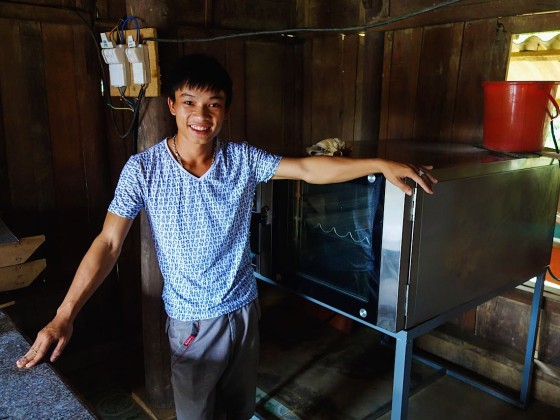Between the walls of a nondescript timber building in Tan Hoa, a young man named Trung vigorously kneads his dough mix. He keeps one eye on the clock hanging above the unhinged door. In three minutes his latest batch of baguettes will be ready, and he’ll have to begin baking his next lot. There is a large quota to meet and he is determined not to miss it. His close friends call out from inside the house to come join them for a shot of rice wine, but their pleas are ignored. Despite their jubilant protests, he can’t afford to skip this deadline. Rice wine won’t pay the bills, and Trung is intent on paying his.

How Tourism Completely Changed This Vietnamese Baker's Life
The province of Quang Binh, in which Tan Hoa is a part, is one of the poorest regions in all of Vietnam. While around 50% of the population in the communist nation are classified as low-income farmers, more than 70% of Quang Binh’s residents work in the agricultural industry.
Until recent years, the opportunities available for the families in Quang Binh to improve their living conditions were minimal. For those that could not afford to leave the province or attend higher education, farming was their only viable option.
Reaching skyward from the farmland, jagged mountains of limestone cast a prehistoric atmosphere, delivering a sense of indescribable awe to those privileged enough to travel through this striking environment. For Tan Hoa, a rural village of 300 people who are enveloped by these imposing karsts, the monoliths had always been little more than a backdrop. Much potential lies hidden amongst the stone, but in the minds of the local Nguon people, it would always remain locked in its current state with little chance of change — much like their own lives.
That was until 2009 when the rediscovery of the world’s largest cave, Hang Son Doong, was confirmed in the Phong Nha-Ke Bang National Park.
For the first time in Quang Binh’s history, tourism was now a major player in the economy. New ventures were forming in which entrepreneurial individuals could capitalize on this incredible opportunity, if they knew how to best take advantage of it. The sustainable adventure tour company Oxalis, which exclusively runs the trekking tours to Hang Son Doong, was one such positive example. Their unique expeditions and community-based business model was a success, helping to inject much-needed tourist dollars into the poor communities of the region.
Trung managed to gain employment as a chef for Oxalis, utilizing his exceptional skills in wilderness cooking to provide delicious meals to guests who pay up to $3,000 for a tour of the gargantuan caverns. Along with many of his friends from his native Tan Hoa, he had been fortunate enough to land his job with Oxalis at the right time. While only 300 people live in the village, more than 40 of them now earn an income either directly or indirectly through the tour company. Above-average wages and a massive potential for personal development makes this an exciting time for the ethnic minority Nguon people.
Not satisfied with this simple favorable chance, Trung sought out more. He took notice that his employer was buying large quantities of bread from the markets in Phong Nha town and transporting them to his village, where tours to the Tu Lan cave systems departed from.
Trung saw an opportunity and began researching the technicalities and costs required in purchasing his own baker’s oven. He studied the best way to produce high-quality bread with other bakers in town. He saw his chance to improve his family’s economic position and quietly toiled toward achieving his goal.
For 18 months, Trung made himself available for every shift that was offered to the crew. He cut down on his monetary spending and stopped drinking with his childhood friends. He kept his dream a secret so as not to receive distraction from his neighbors and comrades.
He estimated that a complete baker’s setup including, among other things, upgrading the electrical supply to his house, dough mixing station and modern oven would cost around US$4,000. In a country where the average wage for rural regions is $2,000 a year, but can actually be as low as $150 annually, this is a massive amount of money. Still, Trung managed to save $3,000 in 18 months. He secured the remaining $1,000 via bank loan, and proudly purchased his new equipment.
Handing in his notice of resignation to Oxalis was a bittersweet moment for Trung. To abandon the company that had provided so much faith and opportunity to him was difficult, but he saw a chance to go beyond simply providing for his family to instead forge a new destiny for them.
Building on his already stellar culinary skills, Trung’s Bakery has quickly established a reputation of providing large quantities of delicious bread. His customers stretch across the township, from small families to growing corporations. Oxalis has enthusiastically become one of his main clients. His friends have drawn inspiration from his entrepreneurial endeavors and are now seeking to capitalize on their own new possibilities.
Under the shadows of limestone, a young baker named Trung is making the most of his opportunity and bringing the village with him.